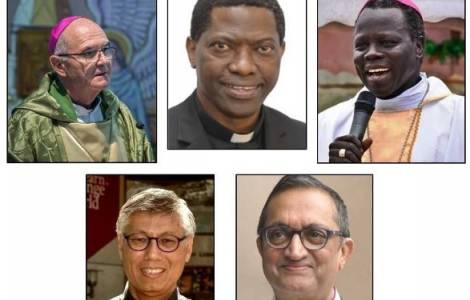- Details
- East Africa
- 912
Vatican City (Agenzia Fides) - Five of the future Cardinals - whose names were announced yesterday, Sunday 9 July, by Pope Francis - come from territories entrusted to the Dicastery for Evangelization. They are Archbishop Stephen Ameyu Martin Mulla of Juba, Archbishop Stephen Brislin of Cape Town, Archbishop-Coadjutor of Tabora Protase Rugambwa, Bishop Sebastian Francis of Penang and Bishop Stephen Chow Sau-Yan S.J. of Hong Kong.
For each of them, the path so far has been marked by different realities and challenges, but always nourished by a deep faith. The Archbishop of Juba (South Sudan), Stephen Ameyu Mulla, had to wait a long time for his installation: the fact that he is not originally from the capital had given rise to long months of protests, tensions and violence (see Fides, 27/4/2021).
The Archbishop of Cape Town (South Africa), Stephen Brislin, who has always been committed to peace in a conflict-ridden country, had appealed to all South Africans "to show their unconditional respect for human life and their commitment to peace. We will not allow those with sinister motives to pit one faith against another, nor to exacerbate tensions within religious groups", the newly appointed cardinal had declared (see Fides, 19/6/2018). "At the end of my mandate in the Vatican offices, particularly in the Dicastery of Evangelization, God wants me to serve him in a different place and in a different way."
These were the words of Archbishop Protase Rugambwa upon his arrival in Tabora (Tanzania) (see Fides, 4/7/2023). Archbishop Rugambwa is a much loved and well-known figure in the Dicastery for Evangelization, where he offered his service for a long time, as President of the Pontifical Mission Societies, and finally as Secretary of the same Dicastery.
An invitation to "have no fear" was extended by Penang Bishop Sebastian Francis to 128 catechumens from 12 parishes and the northern deaneries of the diocese at a multilingual mass for Lent 2023. "You are in the heart of Christ, disciples of Jesus Christ" (see Fides, 18/3/2023).
The Jesuit Stephen Chow Sau-Yan, ordained bishop in the Diocese of Hong Kong in December 2021, after his recent visit to the Diocese of Beijing (see Fides, 17/4/2023) had exhorted to pray to the Holy Spirit to "guide us so that we can learn to love our country and our Church at the same time". "Love for our country is part of the teaching of the Catholic Church", the newly appointed Cardinal had emphasized in this regard. Agenzia Fides






